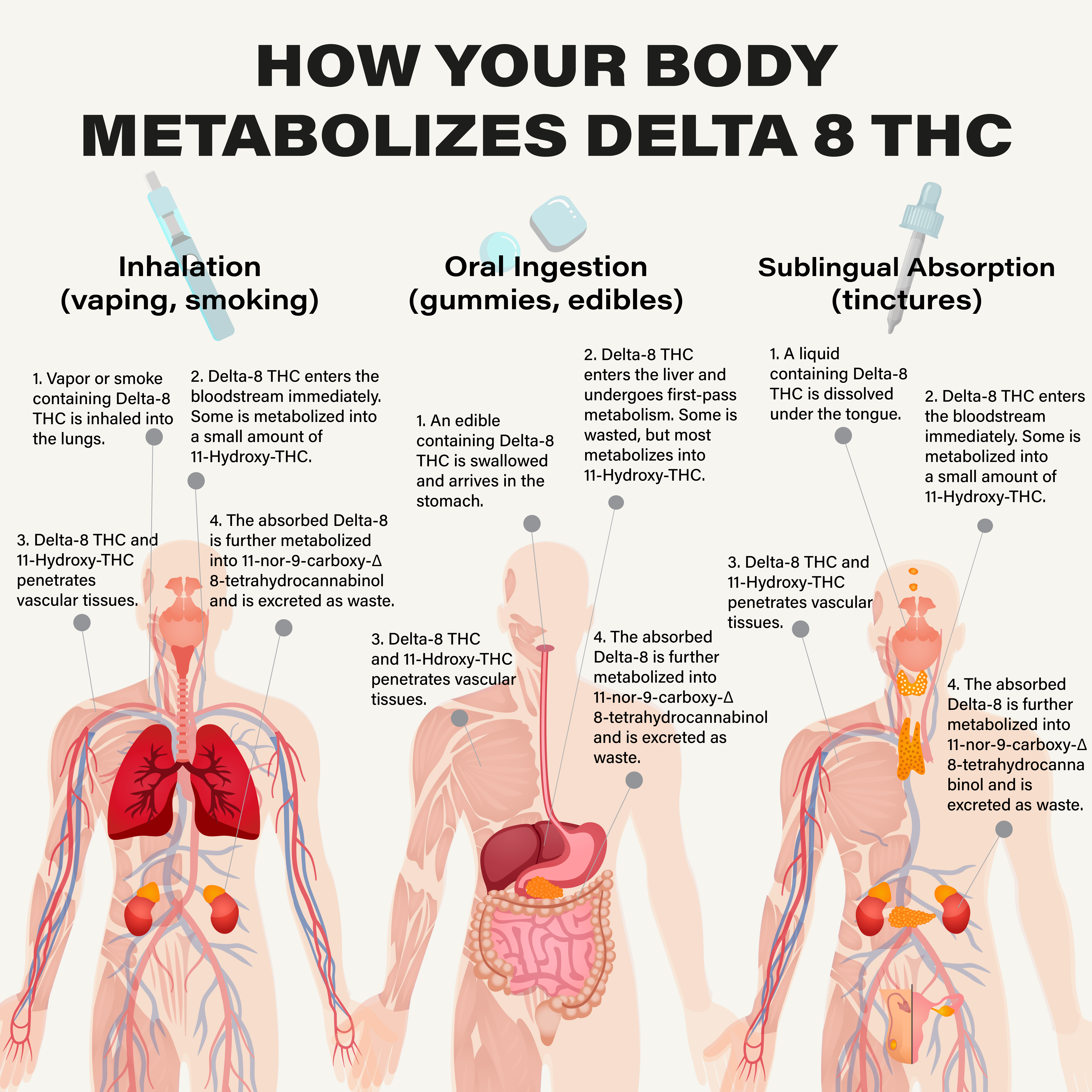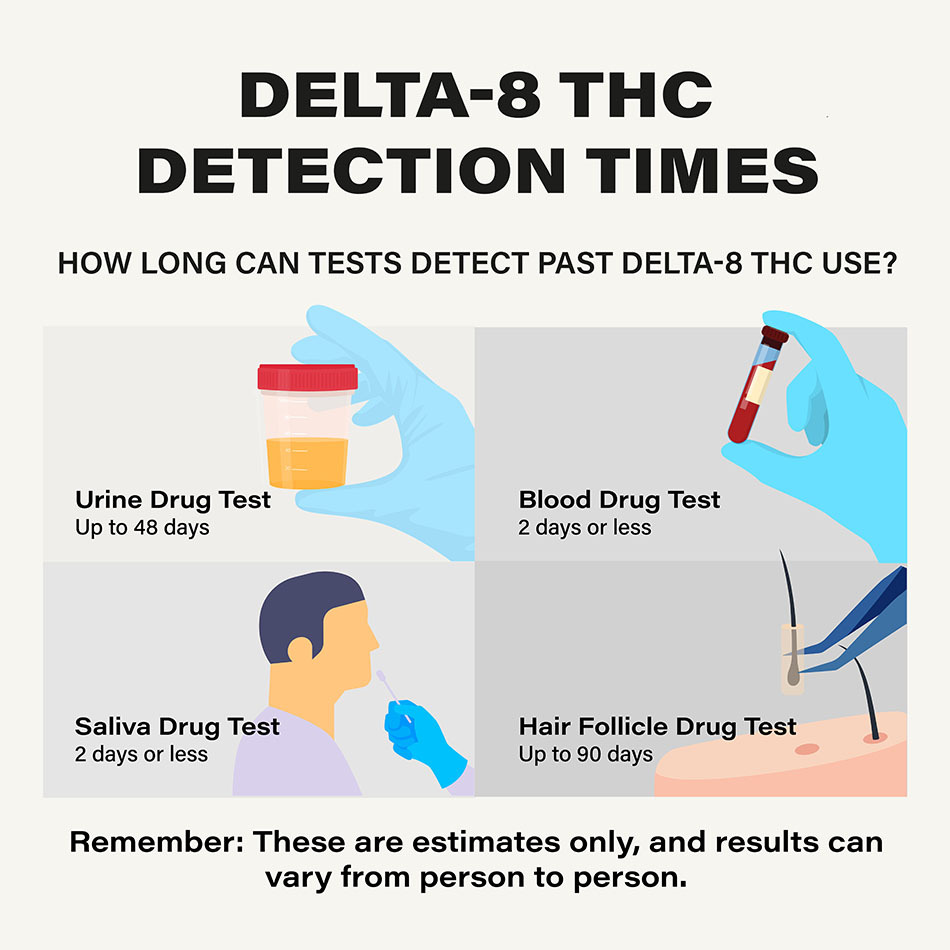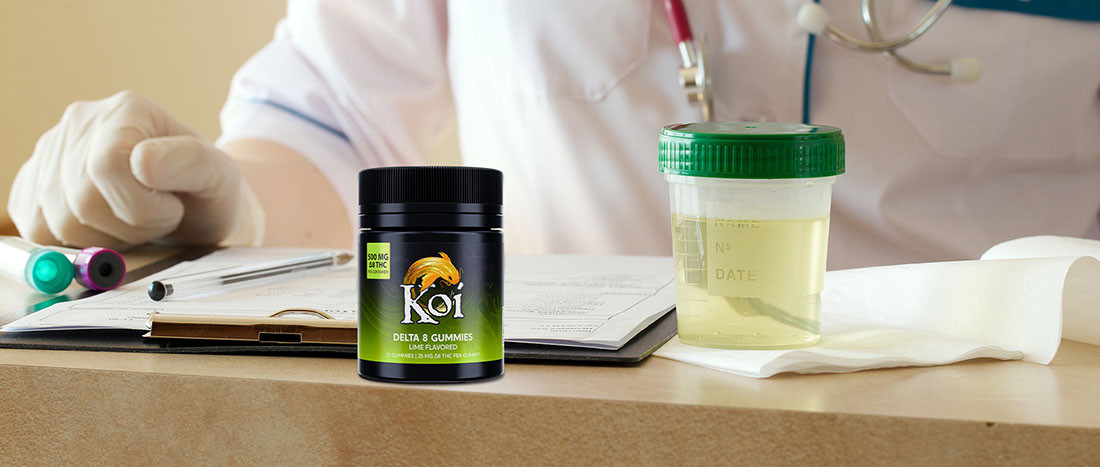Delta-8 THC is legal in the United States, but you’ll want to consider your frequency of use if you’re subject to a drug test. Here’s what you need to know about delta 8 and drug tests.
Key takeaways:
- Yes, delta 8 will show up as a false positive on a drug test if you take it too close to your test date.
- Delta-8 THC is federally legal, but with most tests, it’s indistinguishable from traditional THC.
- If you are concerned about failing a drug test, lay off using delta-8 products for at least 30 days.
Delta-8 THC has surged in popularity following the passage of the 2018 Farm Bill that legalized hemp and its derivatives. It quickly captivated attention because of its more laid-back, uplifting effects. But despite its federal legal status, delta-8 can get you in hot water if you’re subject to drug tests.
Whether your employer or athletic body requires routine drug tests, if you’re interested in using delta-8 THC, you’ll want to understand its potential impact on drug-testing results.
Keep reading to learn about delta-8 and drug tests. You'll get an overview of how long delta-8 stays in your system. Plus, some guidance on how to get rid of delta-8 THC metabolites in your body.
Does Delta 8 Show Up on a Drug Test?
Yes– delta-8 THC will show up on a drug test if you take it too close to your test date.
Most drug tests for THC look for evidence of a recent encounter with the well-known cannabinoid delta-9 THC rather than delta-8 THC. To do this, they screen for the presence of THC-COOH.
THC-COOH is a metabolite formed as your body metabolizes THC. Its technical name is 11-nor-9-carboxy-Δ9-tetrahydrocannabinol. While THC leaves your systems relatively quickly, THC-COOH is lipid-soluble and can remain detectable for weeks after use.
Delta-8 THC produces the metabolite 11-nor-9-carboxy-Δ8-tetrahydrocannabinol, slightly different than 11-nor-9-carboxy-Δ9-tetrahydrocannabinol. While some more expensive tests can differentiate between the two, the ones most commonly used aren’t sophisticated enough to tell the difference.
This is because delta-8 THC and delta-9 THC are closely related. They share the same chemical formula, with slight differences in how their atoms are arranged. For example, delta-8 THC has a double bond on its eighth carbon molecule, while delta-9 THC has one on its ninth.
Despite this difference between delta-8 THC and delta-9 THC, in most drug tests, they’re going to show up the same. So long story short, delta-8 THC can show up on a drug test if you’ve taken it recently.
There’s more to delta 8 and drug testing than the false positive result it might trigger when you partake too close to your test. You should know how drug tests work to help you understand how to adjust or refrain from your delta 8 use to avoid a positive result.
Although a straightforward process, the stress of facing a drug test testing can cause restless nights. Knowing as much as possible about delta 8 and why it might prompt a false positive can help you prepare for tests and reduce the chances of returning a positive result.
How Drug Tests Work
When you use delta 8 products for relaxation or wellness, your body metabolizes the cannabinoid. Once the compound reaches your bloodstream, it interacts with cannabinoid receptors to bring about those relaxing and mood-boosting benefits you enjoy.
But even as the liver metabolizes the compound, the residual metabolites remain in your urine, blood, saliva, sweat, hair, and lungs.
Contrary to popular opinion, the test doesn't check your THC levels. Instead, they look for these metabolites produced by your body when the liver finishes breaking down the THC.
This means that even after the noticeable effects of delta 8 have long disappeared, the metabolites can still let on that you've used the compound recently. If these metabolite levels are significant enough, a drug test will pick them up.
While these workplace tests are meant to screen for delta 9 use rather than delta 8, you can still find yourself in hot water. Because delta 8 and delta 9 are similar, most tests can't tell the difference. And THC-COOH is a metabolite that can stay with you for days or weeks after you last use it or even longer if you partake frequently.
It's harder for the body to get rid of these THC metabolites because they dissolve in fats that don't excrete as quickly as water-soluble compounds.

Delta 8 Vs. Delta 9
If the drug tests are checking for delta 9 metabolites, how come delta 8 triggers a positive result? The answer lies in the similarities between the two cannabinoids.
Delta 8 and Delta 9 are cannabinoids found in cannabis plants, including hemp. Both deliver noticeably elevating benefits that can help you relax and boost your mood.
Delta 8 is a more stable but less potent compound in its uplifting effects, which are mild compared to delta 9. The results of delta 8 are also described as elevating and mildly energizing in lower servings and can produce a sedating effect in higher servings.
The possibility of causing a positive result lies in the similarities between delta 8 and delta 9. For starters, delta 8 shares an almost identical chemical structure with delta 9 because it is an analog compound. The only difference is in the arrangement of the atomic bonds.
In delta 8, there’s a double bond on the 8th carbon chain, while delta 9 has its double bond on the 9th carbon chain.
They also bind to the same receptors (CB1 receptors) in the brain and peripheral nervous system and produce many of the same benefits as delta 9 products.
The two compounds are processed the same way and leave behind the same metabolites. That’s why delta 8 can and will result in a false positive in a drug test looking for delta 9 THC.
Further Reading: Learn more about the differences between delta-8 and delta-9 THC.
What Science Says About Delta 8 and Drug Tests
Research exploring delta-8 and drug tests still need to be done since delta-8 is new.
However, a 2022 study found that the use of delta-8 THC could be identified in a urine drug test by its metabolite, THC-COOH. In 2021, scientists could distinguish between delta-8 THC and delta-9 THC through gas chromatography and fragmentation and confirmed that delta-8 metabolizes in the liver in the same way as delta-9.
How Long Can Delta 8 Stay In Your System?
While the effects of delta-8 last a few hours, your body can show signs of delta-8 THC use for up to three months, depending on individual factors and the type of drug test. So despite its lower potency, delta-8 is detectable for a significant time.
Knowing how fast a compound metabolizes is crucial when considering your risk with a drug test.
Metabolites are small molecules produced when your body breaks down compounds. The metabolites remain behind long after the actual element has left the body. So how long does delta 8 take to break down completely?
Unfortunately, there’s no specific duration for the body to metabolize delta 8. The period it takes depends on the method of ingestion and biological factors like metabolism. Some forms of delta 8 ingestion, like inhalation, have a faster metabolism because they enter the bloodstream faster. In contrast, others methods like oral ingestion will take longer because the compound has to complete digestion before entering the bloodstream.
Passing a drug test depends on the type of test you take. Urine, saliva, blood, and hair follicle tests can detect delta-8 THC, but they vary in how long they can catch past THC use.
Remember: These are estimates only, and results can vary from person to person.

Urine drug tests
Rough estimate: 48 days or less
This is the most common type of THC test. It screens for the presence of THC metabolites in your urine. It can detect THC for up to 48 days in frequent, experienced users but generally up to three days in infrequent or first-time users. Therefore, if you have a scheduled urine drug test, you should avoid delta 8 products for at least ten days beforehand, but ideally longer.
Blood drug tests
Rough estimate: 2 days or less
Blood tests can detect THC metabolites roughly two days after the last use. They are mainly used to check for recent delta 8 THC consumption. If you haven't taken delta 8 products for more than a week, you can feel good about passing a blood test.
Saliva drug tests
Rough estimate: 2 days or less
Saliva tests detect THC presence for up to two days after use. These are mostly preserved for roadside tests when suspected of driving under the influence. Most work-related tests will not use saliva tests because of the short timeline.
Hair follicle drug tests
Rough estimate: 90 days or less
This type of test is a different story. Hair takes a long time to grow, and THC can remain in the hair follicles for up to three months. So although these tests are more effective than urine tests, they are far less common.
What Factors Affect How Long Delta 8 Stays In Your System?
More research is needed to understand how long delta 8 stays in your system and how different factors affect its detection duration. But, there’s enough evidence to identify the significant factors that affect the time it takes for the body to clear the metabolites from your system.
The influential factors that affect the amount of time that THC-COOH lingers in your body include the following:
The Frequency and Volume of Use
More frequent, heavier delta-8 consumers are most vulnerable to urine drug tests than those who use delta-8 products occasionally. So if you're an avid delta 8 fan who takes more delta 8 to experience its effects or takes delta 8 products regularly, listen up. You'll need more time between your last delta 8 use and the test to return a negative test result than someone who uses the compound periodically.
One-time users can generally excrete all THC-COOH in as little as five to eight days. Those who use delta-8 a few times a week will show no signs of use after about two and a half weeks. However, if used every day, it could take a month or more to eliminate all THC-COOH from your system.
Age, Weight, and Metabolism
Physiological factors play a role in how long THC stays in your system. For example, metabolism plays a critical role in processing and clearing THC. The faster your metabolism, the faster your metabolites will leave your body.
Your metabolic rate can be vastly different from someone else's. Generally, active people have a high metabolism meaning their bodies will metabolize delta 8 THC faster than people with a slow metabolism.
If you have a slow metabolism and would like to speed it up to clear delta 8 THC from your body faster, there are a few tips you can try like:
- Exercise more. Interval training and cardio routines help to burn more calories in less time.
- Weight training can also help increase metabolism. By increasing muscle mass in your body, you burn more calories even at rest.
- Try not to skip meals, especially breakfast. It will kick-start your metabolism. Focus on fat-burning foods like eggs, chili peppers, green tea, and whey protein.
- Get a good night’s sleep every night.
Method of Ingestion
How do you use delta 8? That can also play a role in the clearing of THC.
Some methods are more efficient than others. However, as a general rule, if an administration method has a faster onset of effects, the effects will wear out sooner, and the delta 8 will leave your system faster.
For instance, if you use a delta 8 tincture or eat delta 8 gummies, the cannabinoid will typically remain in your body longer than if you vaped it.
Potency Also Matters
The potency of the delta 8 products you consume also influences how long it stays in the body. Delta 8 products with higher strengths tend to last longer than those with lower potency. So if you want delta 8 to flush out of your system more quickly, it's better to pick a delta 8 product with low strength.
Hydration Level
The more fluids you consume and ask your body to process, the more urine you produce, and the quicker metabolites excrete from the body.
You Took Delta-8 Before a Drug Test: Now What?
The safest way to avoid a positive drug test is to refrain from using THC for at least a few weeks leading up to a test. But let's say for argument's sake that you've kicked back with delta-8 recently-- is there anything you can do to metabolite delta 8 faster?
Suppose you're facing a drug test after recently enjoying a delta 8 gummy or another product. In that case, you may be panicked, wondering if there are ways you can metabolize delta 8 faster to eliminate the metabolites from your system.
In online forums, you may find references in cannabis detox programs and claims that they can help the body fast-track delta 8 metabolism. In addition, some of the detox programs involve herbal supplements. However, you should be careful. After all, it's easy to fall victim to low-quality and substandard products because they are not regulated. Also, there's no actual research that suggests that these methods work.
Some methods involve laxatives to trigger diarrhea, and others include drinking copious amounts of water. Unfortunately, these techniques haven't been proven either.
However, if you’ve used delta-8 THC and are hoping to speed up its metabolism, you could try daily vigorous exercise to help you excrete waste through sweat, helping you get rid of THC-COOH and other metabolites. Eating foods higher in protein and fiber will also encourage you to eliminate body waste more regularly, driving THC metabolites from the body faster.
You can also buy at-home drug testing kits to screen your urine for the presence of THC-COOH before your official drug test. However, remember that these tests are not as accurate as official ones.
Is Delta 8 Federally Legal?
Delta-8 THC is legal at the federal level in the United States. The 2018 Farm Bill permits the purchase and use of hemp and its derivatives, including delta-8 THC, provided they contain no more than 0.3% hemp delta-9 THC. Individual states have the right to regulate delta-8, and some have elected to restrict its use.
Although evidence suggests that delta 8 will trigger a false positive test because it is metabolized the same way as delta 9, the question is whether you can get in trouble for testing positive for delta 8 in states where it is legal.
In short - yes. Despite delta-8's legal status at the federal level, most tests cannot tell the difference between traditional THC. As a result, you can set yourself up for trouble with your workplace or athletic organization.
Learn More About Delta-8 THC
Available delta-8 products come in the form of delta-8 gummies, delta-8 tinctures, delta-8 edibles, delta-8 flower, and more.
Delta-8 is one of many new hemp cannabinoids, and there’s much to discover about what delta-8 THC is, whether delta 8 is safe to use, and how delta-8 can help you sleep better.
Want to benefit from hemp but prefer to lower your exposure to detectable THC? Consider broad-spectrum CBD products like Koi Anytime Balance CBD Gummies, Nighttime CBD Gummies, and Koi Naturals CBD Tinctures. In most cases, CBD does not show up on drug tests, but we recommend avoiding any cannabinoid products if you are subject to testing.





